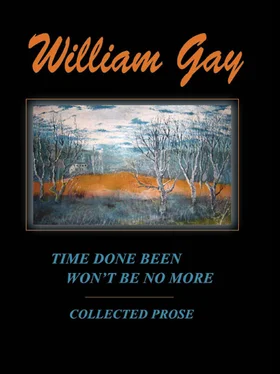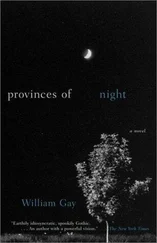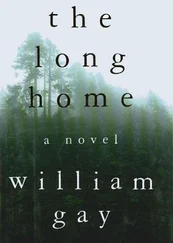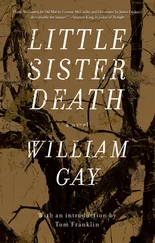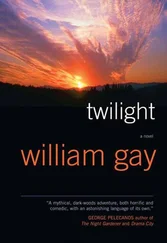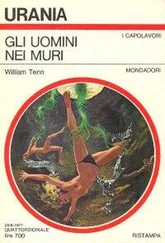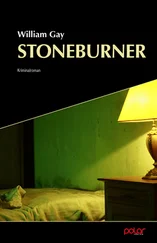His father and his sister were in the next room, the old man abed and the sister attendant. His caved face, his deathroom smell. The eyes of some old predator who’s crawled into his den to die. She turned from her ministering with a damp cloth in her hand and Edgewater saw that the old man had been berating her and she was crying. She dropped the cloth, she turned away and leaned against the plaster. Undone, she wept against limegreen walls. Finally she turned upon her brother such a look of sadness and loss that he wept despite himself. If you weren’t so, she said, and he closed the door in her face.
Before the last door he stood holding the last doorknob. It was hot to the touch and seemed to vibrate beneath his fingers and something was holding it on the other side of the door. He realized that beyond this door lay whatever the other rooms had been preparing him for. He steeled his nerve and took a deep breath of the smoky air and twisted the doorknob hard and shoved the door open and fell into the room.
He woke shaking and appalled and for a moment he didn’t know where he was, where he’d been. He wiped a hand across his mouth. He held his face in his palms. God, he said. God. He raised his face and hugged himself against the cold. The fire had burned to a feathery white ash that rose and drifted in what breeze there was and there was a steely quality to the bluegray light that stood between the trees.
Objects were softly emergent, tree and stump and mossgrown stone, and to Edgewater these objects seemed to be attaining not mere visibility but existence, things that were being born into the world for the first time before his eyes and he studied these things in a kind of bemused wonder.
He had a thought toward rebuilding the fire but more than warmth he wanted quit of this glade of dreams and he paused only long enough to rake the ash away until he found a glowing coal to light his cigarette.
When he came out of the woods onto the roadbed there was already a faint roseate glow in the east and he went on toward it through the first tentative birdsongs. The world was awakening. All sounds were clear and equidistant, somewhere a cock heralded the dawn, on some unseen road a laboring truck shifted gears. A red rim of sun crept above the trees and consumed the horizon with gold and silver light.
Hunger lay in his stomach like a fistsize chunk of teeth and claws and broken bones but his heart was lifting and his feet felt fleet and light. The day was new and unused and this day was one that had never existed before and he saw it as a footpath that led into a world that was sensual and manyfaceted and complex beyond his understanding, but for the moment he was comfortable in it and roofs and shelter and ill weathers were things of no moment. He thought the only dwelling he needed was the unconfined and unwalled world itself.
THAT YEAR THERE SEEMED NO place to keep warm. Wintertime in New York town, the wind blowing snow up and down the streets, sleet spinning against the glass storefronts, wind coming gritty and razorous out of the mouths of alleys, cutting through your clothing to the bone. This was the last of 1963, the cusp of ‘64: Kennedy was in the graveyard and Johnson in the White House, and something was in the wind. The first hints of disquiet in the air. Some dire chord had been strummed, the vibrations were rolling outward, wars and rumors of wars.
Drunk on the rhetoric of Thomas Wolfe, I had left my home in the South and come looking for experience. I had determined to open myself to everything the world had to offer, good and ill, to accumulate life and hoard it like a miser and, at some more contemplative point, try to make sense of it. I had joined the Navy, and now I was in Brooklyn, where Thomas Wolfe had walked the midnight streets and chanted: I wrote ten thousand words today. The Navy had promised travel and experience, and so far it was working out. I was new at the job, but already I had been hassled by cops and hustled by folks in the financial end of the love business, beaten up by Canadian Airmen in Esquimalt, by a street gang in Brooklyn and by a surly bartender in Long Beach. Experience was unfolding itself to me like a flower.
I even had a girl. Her name was Sara and she had almond eyes and long, straight chestnut hair. She was a freshman at a city college and she was into social causes like the burgeoning civil-rights movement. She loved poetry and books and music. She even believed me when I told her I was going to be a writer. We had met in the summer and been together as often as we could through the fall and winter. It was understood that we were soulmates, that we would always be together.
We hung out mostly in the Village, looking for the already ancient footprints of Ginsberg and Kerouac, listening for the fading chants of the Beat Poets, listening to jazz and folk music and blues in the cafés and coffee houses. I was in my civilian clothing, trying to blend, but already the world was aspiring toward a hip scruffiness the Navy wouldn’t tolerate and I had to make do with my regulation haircut and polished shoes.
One Night we were in a coffeehouse when a girl sang a song unlike anything I’d ever heard. This place was a basket-house, a club where musicians who didn’t have paying gigs could perform a set then pass the basket around the audience. If you liked the songs you’d drop a half-dollar or handful of change.
This song seemed to be called, “Don’t Think Twice, It’s All Right” —that was the refrain that ended every chorus. It sounded full of contradictions — traditional in form yet new in sentiment, a love song and a kiss-off, hard and soft, tough and tender at the same time. It was a way of looking at things, a way of turning a hard exterior toward a world always looking for your weaknesses, and it came at you from all over the place. It was bathed in a gothic twilight, roosters crowing at the break of dawn, with more departures down long lonesome roads than a noir novel. It was love and bitterness swirled together: Goodbye’s just too good a word, babe. So I’ll just say fare-thee-well.
I have to talk to her, I told Sara. I want to know where she learned that song.
I don’t think so, Sara said. You just want to meet that singer.
We met her anyway.
Haven’t you heard of Bob Dylan? This is a Bob Dylan song. He’s got a lot of others, too, and they’re all great.
Bob Dylan. I had a vague memory of reading his name in a Nat Hentoff Playboy article on folksingers. But Hentoff hadn’t mentioned this.
The next weekend Sara took me uptown to a record shop she said carried everything, and I bought two Bob Dylan albums. The second one, The Freewheelin’ Bob Dylan , had “Don’t Think Twice” on it. Listening on the phonograph in Sara’s bedroom I realized the words were only half the story: the song was at least half attitude, acting, role-playing something. As if James Dean had merged with Rimbaud and Raymond Chandler and strapped on a flat-top Martin.
And I realized something else. You couldn’t duplicate this; this was a one-time thing. Spend a lifetime learning the picking, and you couldn’t get it the same way twice. Learn every shading and nuance of voice, and this would still be the only one in the world. Even Dylan couldn’t duplicate it, try to Xerox it and the machine would short-circuit and smoke and burn. I felt there was no precedent for this that you could trace folk music back through its entire history, and you would not hear anything like this. The song and the song’s performance came out of someplace raw and powerful, painful as an open wound. It was a way of looking at things in a single frozen moment of time.
Читать дальше
